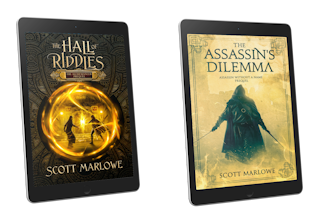
I'm in full edit mode now, hammering and chiseling away at the first draft of The Nullification Engine (The Alchemancer, Book Two). As part of my first pass edit, I'm rewriting or removing anything that doesn't fit with the final narrative, cleaning up anything that was left in a messy state (whether intentional or not), substituting "better" words or descriptions where appropriate, and, last, cleaning up any questionable grammar and incorrect spelling.
All the fun stuff.
While on this journey, I'm finding myself with four essential reference books by my side at all times. These books, as shown above, are: The Emotion Thesaurus, The Synonym Finder, The Chicago Manual of Style, and the Flip Dictionary (which, unfortunately, has gone out-of-print). I've written about The Synonym Finder before (in fact, it's one of my all-time Top 10 viewed posts), but wanted to take a quick look at each of these books right here in this post.
Hopefully you'll find one or more of them useful as well.
| 
| The Emotion Thesaurus breaks down the myriad ways for a writer to convey emotion. An example: Doubt Definition: to lack confidence in or consider unlikely Physical Signals: brows drawing close, face tightening; looking down or away; running hands through hair; tapping fingers (more omitted) Mental Responses: Searching for ideas on how to circumvent the situation (more omitted) Cues of Acute or Long-Term Doubt: Avoiding speaking or agreeing openly (more omitted) You get the idea. There are about fifty or so emotions given similar treatment. I've found it a quick guide to find other ways to highlight a character's response to something as I tend to use the same set of emotions too often. This allows me to better match the emotional response of a particular character with their actual make-up, making each character just a bit more unique. It's an Amazon Top Seller too, so someone else other than me must find it useful. |
 | The Synonym Finder is, at its simplest, a thesaurus. In my previous review, I had this to say: The Synonym Finder reads like a dictionary, except instead of word definitions it's chock full of synonyms. To find a synonym, you simply flip open the book, find your keyword alphabetically, and you're presented with a listing of synonyms. Straightforward and simple. I think that pretty much says it all. This is a great reference book to have at-hand. |
 | Among U.S. book publishers, The Chicago Manual of Style is the most widely used guide to style, editing, and design. My own editor asked at the start of our business relationship if I was alright with him using it as his de facto reference guide. I said 'yes', but then realized I probably should get a copy for myself to use as my own reference. It's not something I refer to very often while working on a first draft, but it is something I intend to keep close as I'm working on subsequent revisions. |
 | Unfortunately, the Flip Dictionary has gone out of print. Bummer. You can still find used copies on Amazon and elsewhere, though. I frequent Half-Priced Books every once in a while, so that might be another option if you have one in your area. The Flip Dictionary is the reverse of a dictionary. You think of a meaning, such as "the study of glands", and the Flip Dictionary provides the word (in this case, endocrinology). It's another handy tool to have in the tool-belt. |

Join my reader's group and get The Hall of Riddles (An Alchemancer Prequel) and The Assassin's Dilemma (An Assassin Without a Name Prequel) as a welcome gift.